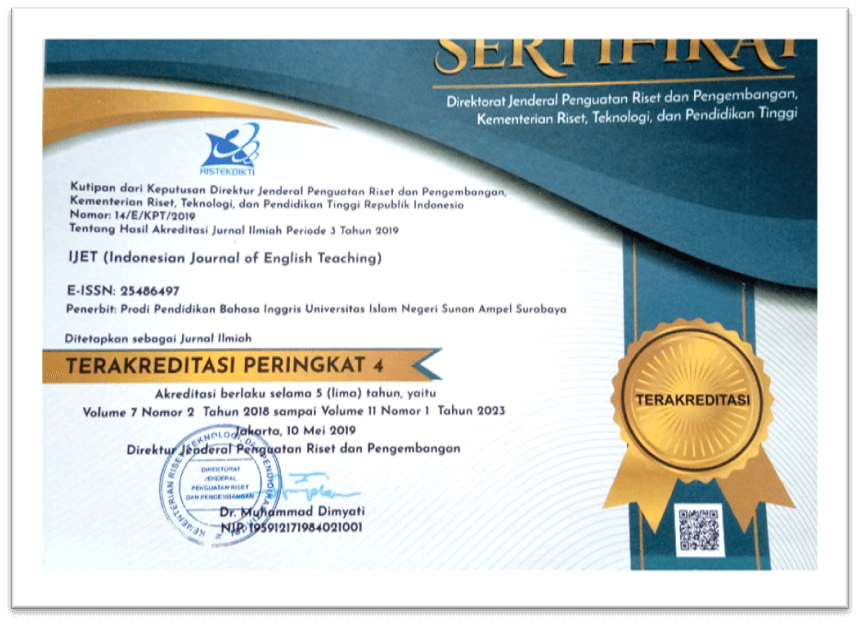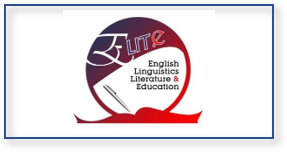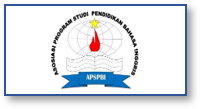Personality Competence and Pedagogical Competence of Pre-service English Teachers in Teaching Secondary Level Students
Keywords:
pre-service English teachers, personality competence, pedagogical competenceAbstract
Since teachers' competencies have significant impacts on their teaching performance, Pre-service English Teachers (PETs) must hone teachers' competencies starting when they are student teachers, especially in teaching practice programs. Personality and pedagogical competence are two competencies that future educators have to develop in addition to social and professional competence. However, there are still few researchers who focus on these two competencies specifically for PETs. This study’s purpose is to look into the personality and pedagogical competence of PETs during their internship program at junior high and high schools. To garner the data, the researchers employed quantitative descriptive research with a survey technique. The data were analyzed quantitatively using SPSS version 26 for Windows. The findings find PETs earned mean scores of 89.57 for personality competence and 86.24 for pedagogical competence. It indicates that, in accordance with Ministry of National Education Regulation Number 16 of 2007, the PETs involved in this study met the requirements to become qualified teachers. They are highly competent in moral behavior and can serve as role models for their students in terms of personality competency, but they lack interest in being a teacher and have difficulties in being responsible and self-assured educators. Meanwhile, for their pedagogical competence, they are highly receptive to ideas and feedback to enhance learning, but they struggle to comprehend students and keep the classroom atmosphere conducive.
Downloads
References
Afalla, B. T., & Fabelico, F. L. (2020). Pre-service teachers’ pedagogical competence and teaching efficiency. Journal of Critical Reviews, 7(11), 223–228. https://doi.org/10.31838/jcr.07.11.36
Andayani, A., Handayani, M., Hanafi, H., Mardiana, A., Prabowo, S., & Saputra, A. H. (2022). The Profile of Professional, Pedagogical, Social, and Personal Competence of Elementary School Teacher Education Graduates. Jurnal Basicedu, 6(3), 3674-3682. https://doi.org/10.31004/basicedu.v6i3.2700
Anggriani, N. Y. (2021). Pengaruh Hasil Belajar Mata Kuliah Profesi Kependidikan dan Persepsi tentang Kesejahteraan Guru Terhadap Minat Menjadi Guru pada Alumni dan Mahasiswa Prodi Pendidikan Administrasi Perkantoran Fakultas Ekonomi Universitas Negeri Medan Stambuk 2016 (Doctoral dissertation, Universitas Negeri Medan).
Arifudin, O., & Ali, H. R. (2022). Teacher Personality Competence in Building the Character of Students. International Journal of Education and Digital Learning (IJEDL), 1(1), 5-12. https://doi.org/10.47353/ijedl.v1i1.3
Bakar, R. (2018). The influence of professional teachers on Padang vocational school students' achievement. Kasetsart Journal of Social Sciences, 39(1), 67-72. https://doi.org/10.1016/j.kjss.2017.12.017
Beare, P., Torgerson, C., Tracz, S., & Grutzik, C. (2019). The CAEP Selectivity Standard and Principal Evaluation of Educator Preparation. Teacher Education Quarterly, 46(2), 142–171. https://www.jstor.org/stable/26746037
Boiliu, N. I., Intarti, E. R., & Lumbantoruan, J. H. (2021). Influence of the personal competence of teachers of Christian Religious Education on learning motivation in high school students in South Tangerang City. In 2nd Annual Conference on blended learning, educational technology and Innovation (ACBLETI 2020) Atlantis Press, 298-302. https://doi:10.2991/assehr.k.210615.058
Cebrián, G., Pascual, D., & Moraleda, Á. (2019). Perception of sustainability competencies amongst Spanish pre-service secondary school teachers. International Journal of Sustainability in Higher Education, 20(7), 1171–1190. https://doi.org/10.1108/IJSHE-10-2018-0168
Depaepe, F., & König, J. (2018). General pedagogical knowledge, self-efficacy and instructional practice: Disentangling their relationship in pre-service teacher education. Teaching and teacher education, 69, 177-190. https://doi.org/10.1016/j.tate.2017.10.003
Eliza, D., Sriandila, R., Fitri, D. A. N., & Yenti, S. (2022). Membangun Guru yang Profesional melalui Pengembangan Profesionalisme Guru dalam Penerapan Profesinya. Jurnal Basicedu, 6(3), 5362-5369. https://doi.org/10.31004/basicedu.v6i3.2878
Ezzi, N. A. A. (2019). Does Personality Influence Pre-service English Teachers' Performance?: A Gender-Based Study in the Yemeni Context. Journal of Education and Development, 3(1), 52. https://doi.org/10.20849/jed.v3i1.566
Fajriah, N., Gani, S. A., & Samad, I. A. (2019). Students’ perceptions toward teacher’s teaching strategies, personal competence, and school facilities. English Education Journal, 10(1), 16-34.
Fitriasari, S., & Masyitoh, I. S. (2020). The Role of Pancasila Education Teachers and Citizenship in Strengthening Character Education Based on Pancasila Values. In 2nd Annual Civic Education Conference (ACEC 2019), Atlantis Press, 534-540. https://doi:10.2991/assehr.k.200320.101
Gao, M., Tu, X., & Li, J. (2021). A review of the research on pre-service English teachers' professional development based on mobile technology. Journal of Language Teaching and Research, 12(3), 404-410. https://doi.org/10.17507/jltr.1203.10
Ghufron, M. A., Taufiq, A., & Riskiyanto, M. (2022). Pre-Service English Teachers’ Pedagogical Competence in Teaching English: A Case of Teaching Internship Program (TIP). English Learning Innovation (englie), 3(1), 27-41. https://doi.org/10.22219/englie.v3i1.19382
Ismail, S. A. A., & Jarrah, A. M. (2019). Exploring Pre-Service Teachers' Perceptions of Their Pedagogical Preferences, Teaching Competence and Motivation. International Journal of Instruction, 12(1), 493-510.
Kheruniah, A. E. (2013). A teacher personality competence contribution to a student study motivation and discipline to fiqh lesson. International Journal of Scientific & Technology Research, 2(2), 108-112.
König, J., Jäger-Biela, D. J., & Glutsch, N. (2020). Adapting to online teaching during COVID-19 school closure: teacher education and teacher competence effects among early career teachers in Germany. European journal of teacher education, 43(4), 608-622. https://doi.org/10.1080/02619768.2020.1809650
Kurnia, D., Toruan, J. L., & Kadir, T. H. (2018). Studi Deskriptif Kompetensi Pedagogik Guru Seni Budaya di SMAN 3 Kota Pariaman. Jurnal Sendratasik, 6(2), 62-68. https://doi.org/10.24036/jsu.v6i1.8450
Latuapo, R. (2023). Personality Competence of Islamic Religion Subject Teachers in the Development of the Al-karimah Character. Al-Ishlah: Jurnal Pendidikan, 15(1), 63-72. https://doi.org/10.35445/alishlah.v15i1.1897
Magnaye, L. J. (2022). Pedagogical and Research Competence of the Pre-service Teachers. American Journal of Multidisciplinary Research and Innovation, 1(3), 81-88. https://doi.org/10.54536/ajmri.v1i3.391
Murkatik, K., Harapan, E., & Wardiah, D. (2020). The influence of professional and pedagogic competence on teacher’s performance. Journal of Social Work and Science Education, 1(1), 58-69. https://doi.org/10.52690/jswse.v1i1.10
Nikolaeva, S., Zadorozhna, I., & Datskiv, O. (2019). Development of Pre-Service English Teachers’ Language Skills and Learner Autonomy via Blended Learning. Revista romaneasca pentru educatie multidimensionala-Journal for Multidimensional Education, 11(2), 222-239. https://doi.org/10.18662/rrem/126
Novebri, N., Kasman, R., & Sabandi, A. (2018). Relationship between pedagogical competence and teacher performance in public elementary school. 966-972. https://doi. org/10.29210/20181139
Pahrudin, P., Martono, T., & Murtini, W. (2016). The effect of pedagogic competency, personality, professional and social competency teacher to study achievement of economic lesson in State Senior High School of East Lombok District Academic year 2015/2016. In Proceeding of the International Conference on Teacher Training and Education (Vol. 2, No. 1, pp. 332-345).
Perni, N. N. (2019). Kompetensi pedagogik sebagai indikator guru profesional. Adi Widya: Jurnal Pendidikan Dasar, 4(2), 175-183. https://doi.org/10.25078/aw.v4i2.1122
Purwatiningsih, N. (2020). Meningkatkan Kompetensi Pedagogik Guru Melalui Supervisi Akademik. Faktor: Jurnal Ilmiah Kependidikan, 7(3), 221-228. http://dx.doi.org/10.30998/fjik.v7i3.7722
Rahmadiyani, S., Hariani, L. S., & Yudiono, U. (2020). Minat Menjadi Guru: Persepsi Profesi Guru, Pengenalan Lapangan Persekolahan (PLP) dan Efikasi Diri. Jurnal Riset Pendidikan Ekonomi, 5(1), 10-23. https://doi.org/10.21067/jrpe.v5i1.4304
Rusyan, A. T., Winarni, W., & Hermawan, A. (2020). Seri pembaharuan pendidikan membangun kelas aktif dan inspiratif. Deepublish.
Sandri, O., Holdsworth, S., & Thomas, I. (2018). Vignette question design for the assessment of graduate sustainability learning outcomes. Environmental Education Research, 24(3), 406-426. https://doi.org/10.1080/13504622.2016.1263280
Sari, P. K., & Yuliana, R. (2022). Correlation between ICT Literacy and Pedagogic Competence of Elementary School Teachers. Journal of Education Technology, 6(3). https://doi.org/10.23887/jet.v6i3.44504
Sariçoban, A., Tosuncuoğlu, İ., & Kirmizi, Ö. (2019). A technological pedagogical content knowledge (TPACK) sssessment of pre-service EFL teachers learning to teach English as a foreign language. Journal of Language and Linguistic Studies, 15(3), 1122-1138. www.jlls.org
Sevimel, A., & Subasi, G. (2018). The factors affecting teacher efficacy perceptions of Turkish pre-service English language teachers. The Journal of Language Learning and Teaching, 8(1), 1-17. https://dergipark.org.tr/en/pub/jltl/issue/42263/508432
Septiani, E., Petrus, I., & Mirizon, S. (2021). The Correlations Among Teachers’ Competences, Students’ Learning Motivation, and Students’ English Proficiency. Eralingua: Jurnal Pendidikan Bahasa Asing dan Sastra, 5(1), 134-151. https://ojs.unm.ac.id/eralingua
Siregar, R. A. (2020). The Effective 21st-century Pedagogical Competence as Perceived by Pre-service English Teachers. Pedagogy: Journal of English Language Teaching, 8(1), 1-12. https://doi.org/10.32332/pedagogy.v8i1.1953
Subekti, A. S. (2021). Covid-19-triggered online learning implementation: Pre-service English teachers’ beliefs. Metathesis: Journal of English Language, Literature, and Teaching, 4(3), 232-248. http://dx.doi.org/10.31002/metathesis.v4i3.2591
Sudargini, Y., & Purwanto, A. (2020). The effect of teachers pedagogic competency on the learning outcomes of students. Journal of Industrial Engineering & Management Research, 1(4), 1-8. https://doi.org/10.7777/jiemar
Sudarwanto, T., & Sulistyowati, R. (2019). The effect of pedagogic competence, professional competence, social competence, and teachers’ personal competence on teachers’ performance in marketing program. KnE Social Sciences, 982-987. https://doi.org/10.18502/kss.v3i11.4065
Sukarni, S., & Rokhayati, T. (2023). Pre-service English Teachers’ Pedagogical Competence, Challenges and Strategies to Facilitate Learning. Journal of English Education and Teaching, 7(2), 162-182. https://doi.org/10.33369/jeet.7.2.162-182
Sukenti, D., & Tambak, S. (2020). Developing Indonesian Language Learning Assessments: Strengthening the Personal Competence and Islamic Psychosocial of Teachers. International Journal of Evaluation and Research in Education, 9(4), 1079-1087. https://doi.org/10.11591/ijere.v9i4.20677
Supriyanto, A., Hartini, S., Irdasari, W. N., Miftahul, A., Oktapiana, S., & Mumpuni, S. D. (2020). Teacher professional quality: Counselling services with technology in Pandemic Covid-19. Counsellia: Jurnal Bimbingan dan Konseling, 10(2), 176-189. http://doi.org/10.25273/counsellia.v10i2.7768
Wicaksono, M., Petrus, I., & Mirizon, S. (2021). The vocational English teachers’ personal competence and its implication on teaching and learning process. EduLite: Journal of English Education, Literature and Culture, 6(1), 71-85. https://doi.org/10.30659/e.6.1.71-85
Witari, I. K. Y. B., & Manuaba, I. S. (2021, April). Correlation Between Pedagogical Competence and Personality to Teacher Performance. In 2nd International Conference on Technology and Educational Science (ICTES 2020), Atlantis Press, 405-412. https://doi:10.2991/assehr.k.210407.272
Zaidan, M. A. (2022). Profesional, Pedagogik, Keterampilan, dan Kinerja Tutor. Cokroaminoto Journal of Primary Education, 5(1), 84-89. https://e-journal.my.id/cjpe










